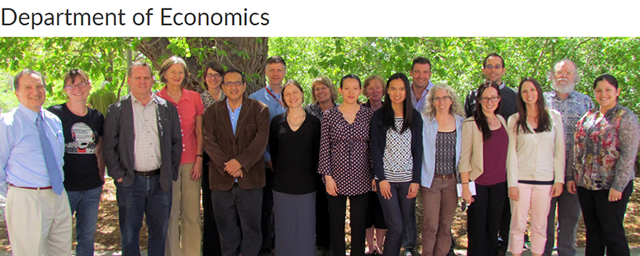
Economics ETDs
Publication Date
8-28-2012
Abstract
Surface water ecosystems such as rivers and lakes provide many benefits to the society. These benefits include both market goods such as drinking water, outdoor recreation, fisheries, as well as non market goods such as habitats for aquatic life, biodiversity, aesthetic attributes, and religious values. Because people value both market and non market goods, benefits from both types of goods must be taken into account for any policy change. The primary objective of this dissertation is to assess public preferences and estimate the benefits of improving environmental quality, water quality in particular, using survey data from Kathmandu, Nepal. Chapter 2 provides estimates of the benefits of improving water quality in the Bagmati River using choice experiment data collected from in-person interviews of 1200 households in Kathmandu, Nepal. Four attributes of river health and cost under different management scenarios are used to estimate willingness-to-pay for the improvements in river water quality. Results from a random parameter logit model show that residents of Kathmandu are willing to pay NRS 1520 (NRS 75=US$ 1) per year to improve the river water quality to a level that is suitable for fish and other aquatic animals from a level that is suitable for walking on the river bank. Similarly, willingness to pay is NRS 1470 per year to improve the river water quality to a level that is suitable for swimming from a level that is suitable for walking on the river bank. In Chapter 3, an attitude-behavior framework is used to investigate the relationship between knowledge, attitude, and behavior towards river conservation, rehabilitation and restoration using data collected from in-person interviews in Kathmandu, Nepal. Results from a bivariate ordered probit model show that pro-environmental attitudes have strong effects on environmental participation. Also, environmental knowledge strongly influences attitude, and participation behavior towards environmental quality. However, scientific and health knowledge do not always translate into pro-environmental behavior. Cultural attachment is strongly associated with pro-environmental attitude, and exposure to information has a strong effect on environmental participation. In Chapter 4, the determinants of water treatment behavior are identified and examined. In particular, the focus is on the impact of knowledge, exposure to information, and community participation towards drinking water treatment behavior. Results from probit regression analyses suggest that knowledge, frequency of exposure to information, and community participation significantly increase the likelihood of utilizing drinking water treatment methods. Households connected to the distribution system are more likely to treat water as compared to those that are not connected to the system. This study is first of its kind to elicit the benefits of improving river water quality in Nepal, and makes a significant contribution to the literature on nonmarket valuation of river water quality improvements in developing countries. Study results will be helpful for policy makers in determining the efficient management strategy, especially for the long term river conservation, rehabilitation, and restoration programs.
Degree Name
Economics
Level of Degree
Doctoral
Department Name
Department of Economics
First Committee Member (Chair)
Berrens, Robert
Second Committee Member
Thomson, Bruce
Language
English
Keywords
Choice Experiments, Valuation, Bagmati River, Water Quality, Willingness to Pay, Random Parameter Model
Document Type
Dissertation
Recommended Citation
Katuwal, Hari. "Demand for Water Quality: Empirical Evidence from a Knowledge, Attitude, Behavior, and Choice Experiment Survey about the Bagmati River in Kathmandu, Nepal." (2012). https://digitalrepository.unm.edu/econ_etds/8
